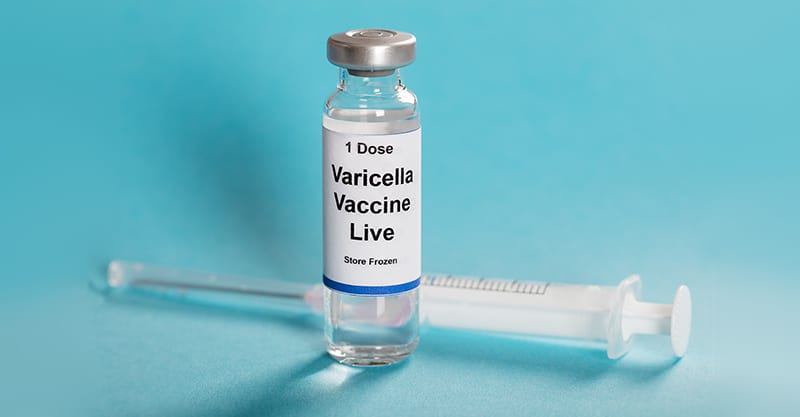By Bridget Reardon
Chickenpox is the lesser weaker cousin of the smallpox. People who contracted smallpox had a fever and a progressive skin rash. Most people who contracted smallpox lived with the scars from it but 3 out of every 10 people that got the disease died from it. Smallpox was officially declared eradicated in 1980 by the World Health Organization due to the understanding of the benefits of vaccinations. The smallpox vaccine was introduced by Edward Jenner in 1796.
Chickenpox is a derivative of smallpox. A typical case of the chickenpox includes symptoms such as 5 to 10 days of fever, loss of appetite, headaches, feeling run down, and pink or red bumps that turn to small blisters and usually become scabs because of how itchy they are. This rash first shows up on areas like the face chest or back and subsequently spreads to the rest of the body. But for some people, the chickenpox has really severe complications. These complications can be things such as pneumonia, encephalitis, cerebellar ataxia, bleeding problems, sepsis, bacterial infections of the skin, soft tissues, bone and blood; and sometimes even death.
Chickenpox, scientifically known as Varicella, is one of the many diseases that most Americans choose to vaccinate their kids for. Varicella is not as dangerous as conditions like measles, hepatitis B, the flu, mumps, or rubella, however, it has serious consequences. Even if your child is generally pretty healthy by not vaccinating your child, you risk your child coming into contact with diseases such as the chickenpox which have generally unpleasant side effects. By a parent not vaccinating their perfectly healthy child, they are putting other perfectly healthy children at risk. Parents who choose not to vaccinate their children are also putting children whose immune systems have been compromised in danger.
News broke in November 2018 that the largest chickenpox outbreak in decades had broken out at a North Carolina school. So far there have been thirty-six reported cases of chickenpox in the population of 152 students enrolled at the Asheville Waldorf School in Asheville, North Carolina. As crazy as this situation might be, this is not the first chickenpox outbreak in this county of North Carolina. Other schools in this county have had chickenpox outbreaks as well in recent years, just none effecting as many children as this outbreak. These previous chickenpox outbreaks had no more than five to eleven children.
So what is going on in this area that chicken pox outbreaks are occurring? Hasn’t there been a vaccine for chicken pox since 1995? This county and the Asheville Waldorf School in particular have extremely high religious exemption rates from vaccinations. Of the 152 children enrolled in the Asheville Waldorf School, 110 of them have religious exemptions from having to be vaccinated. This school in particular had one of the highest rates of religious exemptions in the entire state. In the 2017-2018 school year at the Asheville Waldorf School, two out of three children in the incoming class of kindergarteners was not vaccinated due to a religious exemption.
There are laws to prevent things like this from happening. All 50 states have laws requiring vaccinations for children in schools. Forty-five states and the District of Columbia allow for religious exemptions for vaccinations in schools. Additionally, eighteen states allow parents to seek personal or philosophical exemptions from vaccinating their children. Some states permit both personal and religious exemptions. States that permit both personal and religious exemptions are far more likely to suffer from outbreaks of the chickenpox and other previously eradicated viruses like Polio, Mumps, and Measles.
North Carolina only allows for religious exemptions. If religious exemptions or exemptions in general from vaccinations are this widely used it puts entire schools, and clearly entire counties at risk. Now granted there are people who have a legitimate medical reason for not being vaccinated. Babies have to have their vaccines spaced out so they may not be vaccinated at any given time. Additionally, people with severe life-threatening allergies, pregnant people, people with weakened immune systems due to disease or medical treatments, people who have recently had a blood transfusion or people with tuberculosis are medically exempt from the Chickenpox vaccine.
There are also people who cannot afford access to a doctor to get their children necessary vaccinations. The Patient Protection and Affordable Care Act sought to rectify this by making preventative services like immunization free with insurance coverage. However, many people in the United States still do not have adequate access to healthcare. Sick people and people who cannot access a doctor still benefit from compulsory vaccination laws. The concept of herd immunity still works to protect us all if everyone who is healthy and able to get vaccinated, does.
Many people that choose not to vaccinate do not fall into either of these categories. Many people who choose not to vaccinate are believing in “alternatives to science” and false claims that vaccines cause Autism. These alternatives include things like supplements, herbs, essential oils, homeopathic remedies, and chiropractic adjustments. These alternatives do not work. The best way to protect a child from falling ill with a virus that could have been eliminated by now is to actually vaccinate them. Scientific study after study has proven that vaccines do not cause Autism, yet anti-vaxxers continue to grasp at the straws of a medically disproven study by a British doctor whose medical license has since been revoked.
Bridget Reardon is currently in her second year at Suffolk University Law School where she concentrates in Health and Biomedical Law and works as a Staffer for the Journal of Health and Biomedical Law. She is writing a note on education as healthcare for students with Autism Spectrum Disorders. Her interests include education, health and insurance law.
Sources:
https://www.cdc.gov/smallpox/about/index.html
https://www.who.int/csr/disease/smallpox/en/
https://www.nytimes.com/2018/11/20/health/chicken-pox-vaccine-asheville.html
htps://www.ncleg.net/EnactedLegislation/Statutes/HTML/BySection/Chapter_130A/GS_130A-157.html

